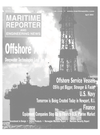
INTERTANKO Holds Firm Position o n M a r i t i m e security
Speaking via a roundtable discussion at the annual Connecticut Maritime Association (CMA) Exhibition 2002 on March 19, Intertanko managing director Peter Swift summed up — in just a fewwords — the position that the organization has established since the terrorist attacks of September II. Swift has made it known that the Oslo, Norway-based organization is working closely via its Washington D.C. affiliate with both the U.S. Coast Guard and IMO to ensure that the tanker market is not the next victim of a terrorist attack.
According to Swift, Dragos Rauta, the organization's technical director and regional manager for North America, who is based in Washington, D.C. is activeiyinvoived inbiiateraidiscussions with the USCG to ensure that these security measures are met. As discussed at the meeting that occurred at the Shipping 2002 Exhibition, a series of measures has been introduced by Intertanko to enhance the awareness of maritime security — beginning with the hot topic of Automatic Identification Systems (AIS). Intertanko's position regarding this is an accelerated of the implementation schedule for the mandatory fitting for all vessels of 500 gt and higher - on International voyages. The final decision regarding this matter is set to be decided at the Diplomatic Conference of MSC in December 2002.
It has also been recommended that SOLAS Chapter XI should focus on special measures on maritime security, thus amending the title accordingly.
New regulations should include requirements for vessels and port facilities, supported by a draft International Code for the Security of Ships and Port Facilities.
In addition to AIS, all ships more than 500 gt engaged in international voyages should have available security plans (SSPs) — plans, which could be audited in the same way with the audits under ISM Code. This same Code also requires a Ship Security Officer (SSO) and Company Security Officer (CSO) onboard each vessel; training needs of this officer should be developed as part of the STCW Convention including the responsibility for instruction of the crew.
Taking A Stance Intertanko is known for its active role in all relevant security conferences, both those arranged in the U.S. in early January 2002, as well as the ISGW that occurred in February. The organization steadfastly supports that a world-wide focus be placed on maritime security and that current regulations are examined to enhance safety to seafarer, ship, cargo and the environment, and that the work is based upon IMO and its subcommittees.
In addition, the organization, which will continue to attend relevant meetings regarding maritime security.
states that measures taken to protect tanker owners should be practical, costeffective and adaptable to local requirements.
According to Rauta. Intertanko technical director and regional manager for North America, the tanker industry is always working to ensure that is prepared for terrorism — even before September 11.
"Tankers will always be targeted because of the nature of their business," Rauta said. "As a result we are in a much better position to deal with potential terrorist attacks because our industry's expectations are so high already."
Other stories from April 2002 issue
Content
- U.S., Spain Team To Develop New Warship page: 4
- Bennis to Lead Maritime, Land Security page: 4
- Halmatic To Supply RIBs For Maritime & Coastguard Agency page: 8
- Germanischer Lloyd Reorganizes Operations page: 11
- Celebrity Cancels Summit And Infinity Sailings page: 11
- Kvaerner And Aker Maritime Join Forces page: 12
- Royal Caribbean And Celebrity Announce Key Appointments page: 13
- Key Port Security Measure Passed page: 16
- Boston Whaler Unveils "Robot" Security Boat page: 18
- Protection Zones In Place For USS Roosevelt's Return page: 19
- DOT Outlines Smart Card Concept For Transportation Workers page: 20
- I MO Calls for Unity on Bulk Carrier Safety page: 22
- OECD Working Group To Brainstorm on Port Security page: 22
- NWDC: The Ultimate One-Stog Shop page: 24
- Boston Whaler Debuts New Security Products page: 26
- No Substitute for A Strong Navy page: 28
- HSV Gets Marines There Faster page: 33
- Information: The Real Power page: 33
- GE Continues To Set Gas Turbine Tech Pace page: 34
- Vericor Is A Reliable Source of Propulsion Power page: 35
- The Allure of Power page: 36
- Spanish Group Endorses Pentamaran page: 37
- industrial Heritage Is Retained page: 38
- MES Completes the World's Largest Diesel Engine page: 39
- Faster Than A Speeding... page: 40
- The Rolls-Royce Design Solution page: 41
- Jane Tide Makes An Impact page: 41
- Halliburton Brings Viking To GOM page: 42
- ABS Speeds Truss Spar Projects to GOM page: 42
- Bollinger Signs Contract For Supply Boat Trio page: 43
- As Banks Step Down, Equipment Finance Companies Step Up page: 44
- Cummins Inc. And CitiCapital Launch Alliance page: 46
- ACR — On The Road To Safety And Survival Technology page: 48
- New Service Frees Ships From Hostile Situations page: 49
- Positive Outlook for Global Subsea Development, Deepwater Strengthening page: 50
- A World of Controversy page: 64
- INTERTANKO Holds Firm Position o n M a r i t i m e security page: 66
- North Mariner — In A Class of Its Own page: 68
- Volvo Penta Engines In Clean Design Ferry page: 69
- Hernis 400 System Is Safe And Sound page: 69
- The Dash for Gas page: 74
- BP's Discovery Is Re-Named Thunder Horse page: 75
- Crowley Moves ExxonMobil Concrete Island Drilling page: 76
- Dresser-Rand Equips Petrobras FPSO page: 76
- Transas Launches LNG Tanker Simulator page: 76

